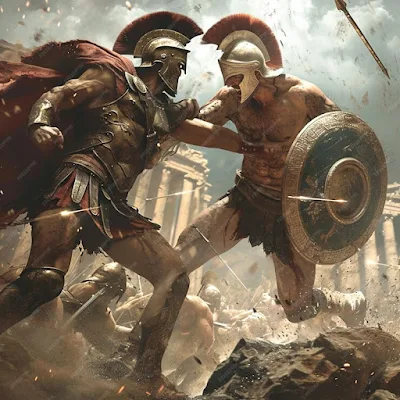Ancient Greece vs. the Roman Empire: A Battle Royale of Strengths and Weaknesses ️
Get ready for a clash of the titans! In this blog, we're throwing down the gauntlet between two powerhouses of the ancient world: Ancient Greece (800 BC - 146 BC) and the Roman Empire (27 BC - 476 AD). We'll explore their strengths and weaknesses in a side-by-side brawl, leaving you to decide who reigns supreme!
Round 1: The Intellectual Arena
Greece: The undisputed champion of philosophy, birthing giants like Socrates, Plato, and Aristotle who shaped Western thought for millennia. Their city-states fostered lively debates on politics, science, and the arts.
Rome: While Rome borrowed heavily from Greek philosophy, they excelled in law and engineering. Their legal code, the Twelve Tables, formed the foundation for many legal systems today. Roman engineers created awe-inspiring aqueducts, roads, and buildings that still stand.
Advantage: This is a close call. Greece scores points for groundbreaking ideas, while Rome shines in practical application.
Round 2: Military Might
Greece: Famed for their phalanx formation, the Greeks dominated warfare for centuries. Leaders like Alexander the Great used innovative tactics to conquer a vast empire. However, their reliance on citizen-soldiers limited their ability to maintain a permanent standing army.
Rome: The Romans were masters of military organization and logistics. Their disciplined legions, skilled in siege warfare and close-quarters combat, conquered most of the known world. Their ability to assimilate conquered peoples strengthened their empire.
Advantage: Rome takes this round. Their professional army and strategic brilliance proved superior in the long run.
Round 3: Political Wrangling
Greece: A land of independent city-states, Greece grappled with constant political squabbles and power struggles. This internal division ultimately weakened their ability to resist external threats.
Rome: Rome's political system evolved from a republic to an empire. While the republic saw its share of internal conflicts, the emperors brought a period of relative stability and unity.
Advantage: Rome again. Their centralized government provided greater stability and focus for expansion.
Round 4: Cultural Influence
Greece: Greek art, literature, and philosophy continue to inspire us today. Their emphasis on reason, logic, and individual achievement laid the groundwork for Western civilization.
Rome: Rome acted as a cultural melting pot, adopting and adapting elements from conquered peoples. Their legacy lives on in language (Latin), architecture, and legal systems.
Advantage: Another close call. Greece's impact on philosophical thought is undeniable, but Rome's widespread cultural influence is vast.
The Outcome: A Draw!
Both Greece and Rome were extraordinary civilizations that indelibly shaped the course of history. While Greece dominated in philosophy and birthed democracy, Rome excelled in law, engineering, and military might. Their cultural legacies continue to influence us today.
The real winner? Us! We get to learn from the triumphs and failures of these ancient giants. So, who reigns supreme in your eyes? Let us know in the comments below what impressed you most about each civilization!
Don't Forget the Drama: Epic Battles That Defined the Rivalry ⚔️
Our exploration of Greece vs. Rome wouldn't be complete without diving into some history-changing clashes! Here are two epic battles that perfectly illustrate the strengths and weaknesses of each civilization:
The Battle of Marathon (490 BC):
The Players: Greece (led by Miltiades) vs. Persian Empire (led by Datis and Artaphernes)
The Cause: The Persians sought to conquer Greece and add it to their vast empire.
The Advantage: Greece. Though outnumbered, the Greeks used their phalanx formation and the natural terrain to their advantage on the battlefield of Marathon.
The Outcome: A decisive Greek victory that shattered the myth of Persian invincibility and boosted Greek morale.
The Punic Wars (264 BC - 146 BC):
The Players: Rome vs. Carthage (a powerful Phoenician city-state in North Africa)
The Cause: Rivalry for control of the Mediterranean Sea and trade routes.
The Advantage: Rome. While Carthage boasted a strong navy, Rome's superior military organization and determination ultimately prevailed.
The Outcome: A series of grueling wars culminating in the complete destruction of Carthage, solidifying Roman dominance in the Mediterranean.
These battles highlight the key differences between the two civilizations. Greece's reliance on citizen-soldiers, while effective for short bursts, couldn't match Rome's ability to sustain long-term campaigns.
But wait, there's more!
This blog is just the beginning. We'll be diving deeper into specific aspects of Greek and Roman life in future posts. Want to know more about the daily lives of Roman citizens? Curious about the groundbreaking scientific discoveries of the Greeks? Stay tuned for more exciting explorations into the ancient world!



